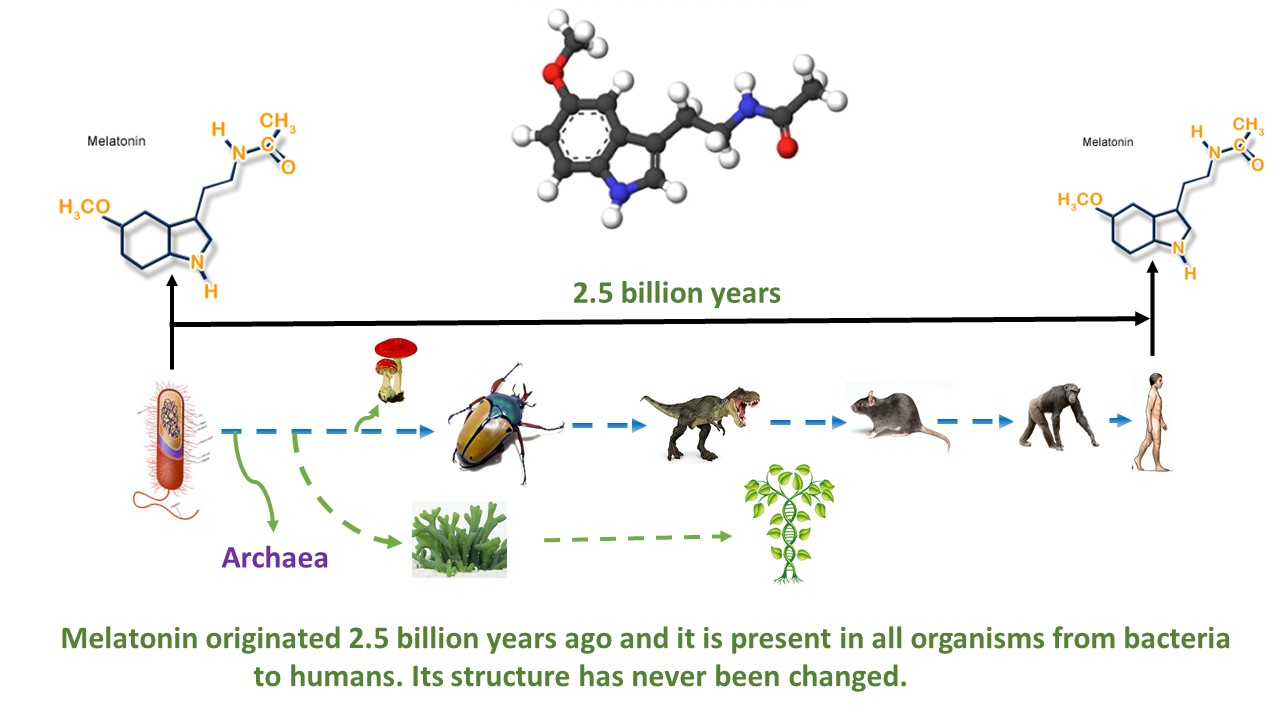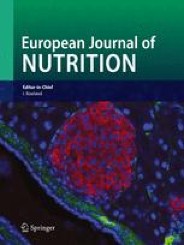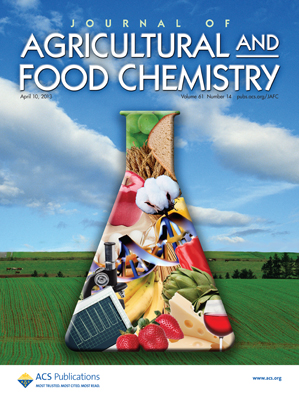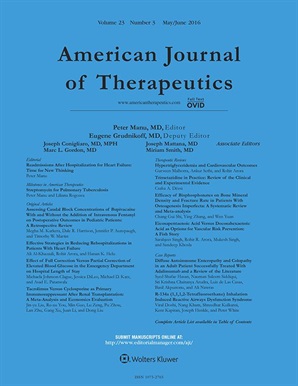Tryptophan
How to submit an article:
- Registered users can submit any published journal article that has a unique DOI (Digital Object Identifier) name or link to Research Hub.
- For example, you can paste the full DOI link:
https://doi.org/10.1109/5.771073or just the DOI name:10.1109/5.771073into the field above and click submit. - The person who is first to submit a valid article to Research Hub will forever be credited for it, and every article submission earns you +6 Research Points.
Related Topics
Published research studies are articles that present the findings of original research that has undergone a peer-review process and has been made publicly available in scholarly journals, books or other media.

A randomized clinical trial to test efficacy of chamomile and saffron for neuroprotective and anti-inflammatory responses in depressive patients
2022 Oct Heliyon Ahmad S, Azhar A, Tikmani P, Rafique H, Khan A, Mesiya H, et al.
Randomised Controlled Trial Anti-Inflammatory Saffron Chamomile NeuroprotectiveThe combined use of chamomile and saffron with usual medication enhances the efficacy against depression and ensures long term improvement.

Serotonin, melatonin and their precursors and metabolites and vitamin D3 derivatives in honey
2022 Sep 30 Melatonin Research Kim TK, Fabisiak A, Brzeminski P, Reiter RJ, Slominski AT
Review Article Serotonin Honey Vitamin D MelatoninRecent revelations of L-DOPA, dopamine, 5-hydroxytryptophan, tryptamine, serotonin, N-acetylserotonin, melatonin, 2-hydroxymelatonin, AFMK, AMK, and vitamin D3 derivatives in honey expand its health benefits.

Jian-Pi-Yi-Shen Formula Improves Adenine-Induced Chronic Kidney Disease via Regulating Tryptophan Metabolism and Aryl Hydrocarbon Receptor Signaling
2022 Jul 05 Frontiers in Pharmacology Liu X, Deng R, Chen Y, Huang S, Lu J, Zheng L, et al.
Network Pharmacology Tryptophan Chronic Kidney DiseaseThe Jian Pi Yi Shen formula in traditional Chinese medicine demonstrates a protective effect on kidneys by modulating tryptophan metabolism and Aryl hydrocarbon receptor activation.

Tryptophan intake is related to a lower prevalence of depressive symptoms during pregnancy in Japan: baseline data from the Kyushu Okinawa Maternal and Child Health Study
2022 Jul 27 European Journal of Nutrition Miyake Y, Tanaka K, Okubo H, Sasaki S, Arakawa M
Higher tryptophan intake was independently inversely associated with the prevalence of depressive symptoms during pregnancy in Japanese women, as indicated by adjusted prevalence ratios. The study found that the prevalence of depressive symptoms decreased with increasing quartiles of tryptophan intake, suggesting a potential protective effect of tryptophan against depressive symptoms during pregnancy.
Cohort Study Depression Pregnancy Tryptophan
Shenling Baizhu San ameliorates ulcerative colitis by regulating the gut microbiota and its tryptophan metabolites: A complementary medicine to mesalamine
2022 Jun Journal of Ethnopharmacology Jiao C, Zhang Q, Yang M, Ma J, Zhao X, Tang N, et al.
Cohort Study Clinical Study Shen Ling Bai Zhu San Ulcerative ColitisShenling Baizhu San (SBS), combined with mesalamine, can treat ulcerative colitis effectively by changing gut microbiota structures and increasing tryptophan metabolite levels.
Research insights are moderated by the Research Hub team and offer an at-a-glance overview of interesting research findings.

2022 Heliyon
The combined use of chamomile and saffron with usual medication enhances the efficacy against depression and ensures long term improvement.
Randomised Controlled Trial Anti-Inflammatory Chamomile Neuroprotective Saffron
A randomized clinical trial to test efficacy of chamomile and saffron for neuroprotective and anti-inflammatory responses in depressive patients
Ahmad S, Azhar A, Tikmani P, Rafique H, Khan A, Mesiya H, et al.

2022 Melatonin Research
Recent revelations of L-DOPA, dopamine, 5-hydroxytryptophan, tryptamine, serotonin, N-acetylserotonin, melatonin, 2-hydroxymelatonin, AFMK, AMK, and vitamin D3 derivatives in honey expand its health benefits.
Review Article Honey Melatonin Serotonin Vitamin D
Serotonin, melatonin and their precursors and metabolites and vitamin D3 derivatives in honey
Kim TK, Fabisiak A, Brzeminski P, Reiter RJ, Slominski AT

2022 Frontiers in Pharmacology
The Jian Pi Yi Shen formula in traditional Chinese medicine demonstrates a protective effect on kidneys by modulating tryptophan metabolism and Aryl hydrocarbon receptor activation.
Network Pharmacology Chronic Kidney Disease
Jian-Pi-Yi-Shen Formula Improves Adenine-Induced Chronic Kidney Disease via Regulating Tryptophan Metabolism and Aryl Hydrocarbon Receptor Signaling
Liu X, Deng R, Chen Y, Huang S, Lu J, Zheng L, et al.

2022 Journal of Ethnopharmacology
Shenling Baizhu San (SBS), combined with mesalamine, can treat ulcerative colitis effectively by changing gut microbiota structures and increasing tryptophan metabolite levels.
Cohort Study Shen Ling Bai Zhu San Ulcerative Colitis
Shenling Baizhu San ameliorates ulcerative colitis by regulating the gut microbiota and its tryptophan metabolites: A complementary medicine to mesalamine
Jiao C, Zhang Q, Yang M, Ma J, Zhao X, Tang N, et al.

2022 Journal of Agricultural and Food Chemistry
Pu-erh tea may prevent circadian rhythm disorders by promoting tryptophan metabolism and signaling interactions in the gut-liver-brain axis.
Experimental Study Cholesterol Circadian Rhythm Intestinal Inflammation Pu-Erh Tea
Pu-erh Tea Restored Circadian Rhythm Disruption by Regulating Tryptophan Metabolism
Hu S, Luo L, Bian X, Liu RH, Zhao S, Chen Y, et al.
Review Articles
Review articles summarise and critically evaluate the current state of research on a specific topic or field by synthesising multiple primary research studies.

Serotonin, melatonin and their precursors and metabolites and vitamin D3 derivatives in honey
2022 Sep 30 Melatonin Research Kim TK, Fabisiak A, Brzeminski P, Reiter RJ, Slominski AT
Review Article Serotonin Honey Vitamin D MelatoninRecent revelations of L-DOPA, dopamine, 5-hydroxytryptophan, tryptamine, serotonin, N-acetylserotonin, melatonin, 2-hydroxymelatonin, AFMK, AMK, and vitamin D3 derivatives in honey expand its health benefits.

Nutritional Content and Health Benefits of Eggplant
2020 Jan Turkish Journal of Agriculture - Food Science and Technology Muhammad Yasir Naeem, Senay Ugur
Review ArticleClinical Trials
Clinical trials are research studies that involve people and are conducted to evaluate the safety and efficacy of new treatments or interventions, such as drugs, medical devices, or behavioural therapies.

A randomized clinical trial to test efficacy of chamomile and saffron for neuroprotective and anti-inflammatory responses in depressive patients
2022 Oct Heliyon Ahmad S, Azhar A, Tikmani P, Rafique H, Khan A, Mesiya H, et al.
Randomised Controlled Trial Anti-Inflammatory Saffron Chamomile NeuroprotectiveThe combined use of chamomile and saffron with usual medication enhances the efficacy against depression and ensures long term improvement.

The effect of acupuncture on depression and its correlation with metabolic alterations
2020 Oct 23 Medicine Li W, Sun M, Yin X, Lao L, Kuang Z, Xu S
Electroacupuncture (EA) treatment combined with antidepressants is more effective in improving depressive symptoms than antidepressants alone. EA may treat depression by acting on tryptophan metabolism, glutamate metabolism, and fatty acid biosynthesis.
Randomised Controlled Trial Depression
Pilot Study of the Tart Cherry Juice for the Treatment of Insomnia and Investigation of Mechanisms
2018 Mar American Journal of Therapeutics Losso JN, Finley JW, Karki N, Liu AG, Prudente A, Tipton R, et al.
Randomised Controlled Trial Cherry Insomnia Tryptophan SleepCherry juice increases sleep time and efficiency in older adults with insomnia, potentially due to its inhibition of a process that degrades tryptophan and stimulates inflammation.
Study Protocols
Published study protocols are detailed plans that outline the objectives, methodology, statistical analyses, and organisation of a research study that have been made publicly available for others to review and use as a reference.
Presentation Slides

Randomised Controlled Trial
The combined use of chamomile and saffron with usual medication enhances the efficacy against depression and ensures long term improvement.
Ahmad S, Azhar A, Tikmani P, Rafique H, Khan A, Mesiya H, Saeed H

Review Article
Recent revelations of L-DOPA, dopamine, 5-hydroxytryptophan, tryptamine, serotonin, N-acetylserotonin, melatonin, 2-hydroxymelatonin, AFMK, AMK, and vitamin D3 derivatives in honey expand its health benefits.
Kim TK, Fabisiak A, Brzeminski P, Reiter RJ, Slominski AT

Network Pharmacology
The Jian Pi Yi Shen formula in traditional Chinese medicine demonstrates a protective effect on kidneys by modulating tryptophan metabolism and Aryl hydrocarbon receptor activation.
Liu X, Deng R, Chen Y, Huang S, Lu J, Zheng L, Xiong G, Li S

Cohort Study
Shenling Baizhu San (SBS), combined with mesalamine, can treat ulcerative colitis effectively by changing gut microbiota structures and increasing tryptophan metabolite levels.
Jiao C, Zhang Q, Yang M, Ma J, Zhao X, Tang N, Dai M, Li Q, Jiang Z, Huang X, Zhang H, Sun L

Experimental Study
Pu-erh tea may prevent circadian rhythm disorders by promoting tryptophan metabolism and signaling interactions in the gut-liver-brain axis.
Hu S, Luo L, Bian X, Liu RH, Zhao S, Chen Y, Sun K, Jiang J, Liu Z, Zeng L

Randomised Controlled Trial
Cherry juice increases sleep time and efficiency in older adults with insomnia, potentially due to its inhibition of a process that degrades tryptophan and stimulates inflammation.
Losso JN, Finley JW, Karki N, Liu AG, Prudente A, Tipton R, Yu Y, Greenway FL
Executive Summary
Write an executive summary in the form of a blog article on the topic of "Research into Chinese medicine treatment for Tryptophan" summarising the research below and using language that can be easily understood by patients and avoiding medical jargon using a professional and caring tone of voice.
Write an executive summary in the form of a blog article on the topic of "Researched Chinese medicine treatments for Tryptophan" summarising the research below in an objective and easy to understand way, and using language that can be easily understood by patients. Group the article into Chinese medicine treatments first, followed by nutrition and other treatments. Avoid using medical jargon and use a professional and caring tone of voice.
Write me a concise but easy to understand executive summary on the topic of "Chinese medicine treatments for Tryptophan" based on the following research that I will give you. Your summary should be 2 paragraphs long in Australian English spelling and include references to the studies.
A Randomised Controlled Trial published in 2022 in the journal Heliyon found that The combined use of chamomile and saffron with usual medication enhances the efficacy against depression and ensures long term improvement. This research was a randomized, open, blinded trial with 120 participants split evenly into a test and control group. After consent was obtained, a patient health questionnaire was filled out to determine depression scores. Participants in the test group received herbal tea sachets, containing 20 mg of chamomile and 1 mg of saffron, twice per day for a month in addition to their regular medications. Control group participants only received their standard allopathic medicine. Blood samples were taken both before and after the treatment period. The test showed significant improvement in depressive symptoms for both groups. However, in the test group, the addition of the herbal teas amplified the effect of the medications. The herbal adjuvant therapy reduced inflammatory markers and tryptophan levels in plasma, which increased the availability of tryptophan in the brain, a key aspect in managing depression. Consequently, the research concluded that inclusion of these herbs enhances the effectiveness of the conventional treatment against depression and provides long term benefits.
A Review Article published in 2022 in the journal Melatonin Research found that Recent revelations of L-DOPA, dopamine, 5-hydroxytryptophan, tryptamine, serotonin, N-acetylserotonin, melatonin, 2-hydroxymelatonin, AFMK, AMK, and vitamin D3 derivatives in honey expand its health benefits. The identification of L-DOPA, dopamine, 5-hydroxytryptophan, tryptamine, serotonin, N-acetylserotonin, melatonin, 2-hydroxymelatonin, AFMK, AMK, and vitamin D3 derivatives in honey aligns with their presence in insects and plants. Serotonin and melatonin, integral to tryptophan metabolism, serve diverse roles as hormones, neurotransmitters, and antioxidants. Dopamine and tryptamine, essential neurotransmitters, have broad significance across species. The detection of these molecules in honey, a widely consumed health-promoting substance, enhances its beneficial effects on human health. The findings highlight the multifaceted composition of honey, encompassing compounds with recognized roles in neurotransmission, antioxidant activity, and hormonal regulation. The presence of these molecules not only broadens honey's spectrum of health benefits for humans but also implies their significance in the intricate physiology of social insects, influencing bee development and colony functions. The co-detection of these compounds with vitamin D3 derivatives further underscores the interconnectedness of honey with insect and plant biology, shedding light on potential synergies that contribute to the diverse positive effects of honey on human health.
A Network Pharmacology published in 2022 in the journal Frontiers in Pharmacology found that The Jian Pi Yi Shen formula in traditional Chinese medicine demonstrates a protective effect on kidneys by modulating tryptophan metabolism and Aryl hydrocarbon receptor activation. A chronic kidney disease (CKD) rat model was induced by feeding a diet containing 0.75% adenine over a four-week period. Concurrently, the Jian-Pi-Yi-Shen formula was administered every day starting from the third week and continued for four additional weeks. Multiple factors were evaluated including renal injury, fibrotic markers expression, and serum creatinine and blood urea nitrogen levels. The levels of 10 tryptophan metabolites in the rat serum and Aryl hydrocarbon receptor signaling were detected and analyzed using ultra-high performance liquid chromatography-tandem mass spectrometry and Western blot analysis, respectively. The Jian-Pi-Yi-Shen formula demonstrated significant effects of reducing both serum creatinine and blood urea nitrogen levels and improving renal pathological injuries in the CKD rat model. It was found that the formula also regulated tryptophan metabolism and decreased the levels of tryptophan metabolites in the serum. Furthermore, the formula suppressed the overactivated Aryl hydrocarbon receptor signaling in the kidney. These observations imply that the actions of the Jian-Pi-Yi-Shen formula could effectively protect against CKD.
A Cohort Study published in 2022 in the journal Journal of Ethnopharmacology found that Shenling Baizhu San (SBS), combined with mesalamine, can treat ulcerative colitis effectively by changing gut microbiota structures and increasing tryptophan metabolite levels. The methodology involved conducting a prospective cohort study to explore the potential therapeutic effects of SBS, used as a complementary medicine with mesalamine, on ulcerative colitis patients. There were 48 patients included in the study, out of which 24 were a part of the control group and given just mesalamine, while the remaining patients in the experimental group were administered mesalamine along with SBS. The efficacy of these treatments was evaluated after an elapsed period of 8 weeks. The study utilized procedures like 16S rRNA sequencing to observe the structures of gut microbiota (GMB), and UPLC-MS/MS to analyze microbial tryptophan metabolites. In terms of results discussion, the study noticed that the combination of SBS and mesalamine significantly enhanced the clinical symptoms of ulcerative colitis. This was observed through mucosal healing and reduced damage to the colon that the medicinal combination induced. The research also highlighted a novel discovery, the alteration of gut microbiota structures, and an observable increase in microbial levels of tryptophan metabolites when both SBS and mesalamine were used. This led to the conclusion that SBS acted as an effective supplementary therapy to the standard treatment, easing ulcerative colitis through an identified GMB-tryptophan metabolite axis.
A Experimental Study published in 2022 in the journal Journal of Agricultural and Food Chemistry found that Pu-erh tea may prevent circadian rhythm disorders by promoting tryptophan metabolism and signaling interactions in the gut-liver-brain axis. Healthy mice were administered water or 0.25% Pu-erh tea over a period of seven weeks, and then subjected to a disruption of their light/dark cycle for forty days. The assessment of effects was based on changes in neurotransmitter secretion and gene oscillations, intestinal inflammation, and the balance of intestinal microbes and metabolites. Results indicated that Pu-erh tea had beneficial impacts in regulating neurotransmitter secretion and clock gene oscillations, especially indole and 5-hydroxytryptamine pathways, a key process involving the gut-liver-brain axis. Moreover, the tea's metabolites improved release of brain hormones, thus enhancing hepatic glycolipid metabolism and lowering intestinal oxidative stress. Further observed beneficial effects included promotion of liver lipid metabolism and reduction of intestinal inflammation, via the enterohepatic circulation.
A Randomised Controlled Trial published in 2018 in the journal American Journal of Therapeutics found that Cherry juice increases sleep time and efficiency in older adults with insomnia, potentially due to its inhibition of a process that degrades tryptophan and stimulates inflammation. The study followed a placebo-controlled balanced crossover design, with subjects older than 50 years old with insomnia being randomized to either placebo or cherry juice consumption twice daily for two weeks, with a two-week washout period in between. Sleep was evaluated using polysomnography and five validated questionnaires, while serum measurements were conducted for several bio-indicators. In vitro studies were also performed to determine the ability of cherry juice components to inhibit a specific physiological process. The study found that sleep time increased by 84 minutes per polysomnography evaluations and sleep efficiency increased per the Pittsburgh Sleep Quality Index. Serum measurements revealed decreased levels of certain bio-indicators suggesting reduced inflammation. In vitro studies also found that components present in cherry juice inhibited a specific process that degrades the amino acid tryptophan, potentially leading to these improved sleep outcomes. Other questionnaires, however, showed no significant differences in results.
Moderation Tools
Topic
Sign In
Users not signed in are limited to viewing the 5 most recent items of content.
not found? — 24 Aug 2021